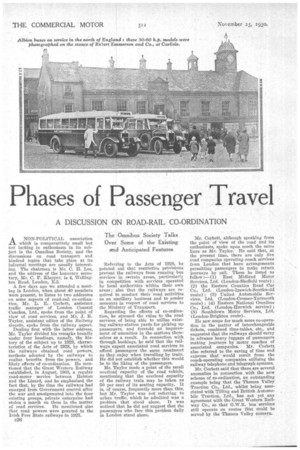Phases of Passenger Travel
Page 58

If you've noticed an error in this article please click here to report it so we can fix it.
A DISCUSSION ON ROAD-RAIL CO-ORDINATION
The Omnibus Society Talks Over Some of the Existing end Anticipated Features ANON-POLITICAL association which is comparatively small but not lacking in enthusiasm in its subject is the Omnibus Society, and the discussions on road transport and kindred topics that take place at its informal meetings are usually interesting. The chairman is Mr. C. H. Lee, and the address of the honorary secretary, Mr. C. F. Klepper, is 4, Wellington Road, Loudon, E.3.
A few days ago we attended a meeting in London, when about 40 members were present, to listen to two addresses on some aspects of road-rail co-ordination. Mr. L. E. Corbett, assistant traffic manager of London Coastal Coaches, Ltd., spoke from the point of view of road services, and Mr. J. K. Taylor, assistant editor of the Railway Gazelle, spoke from the railway aspect. Dealing first with the latter address, Mr. Taylor divided his remaj•ks broadly under four headings, namely, the history of the subject up to 1928. characteristics of the Acts of 1928, by which the railways obtained road powers, methods adopted by the railways to realize benefits from the powers, and likely effects of co-ordination. He mentioned that the Great Western Railway established, in August, 1903, a regular road-motor service between Helston and the Lizard, and he emphasized the fact that, by the time the railways had emerged from Government control after the war and amalgamated into the four existing groups, private enterprise had stolen a march on them in the matter of road services. He mentioned also that road powers were granted to the Irish Free State railways in 3.927.
C36 Referring to the Acts of 1928, he pointed out that restrictive provisions Prevent the railways from running bus services in certain areas, particularly in competition with services operated by local authorities within their own areas ; also that the railways are required to conduct their road activities as an ancillary business and to render accounts in respect of road services to the Ministry of Transport.
Regarding the effects of co-ordination, he stressed the value to the road services of being able to utilize existing railway-station yards for picking up passengers, and foretold an improvement of amenities in the stations themselves as a result. In connection with through bookings, he said that the railways expect associated road services to afford passengers the same treatment as they enjoy when travelling by train. He did not establish whether this would be to the liking of the passengers.
Mr. Taylor made a point of the small overload capacity of the road vehicle mentioning that the overload capacity of the railway train may be taken as 50 per cent of its seating capacity. It is, of course, frequently more than this, but Mr. Taylor was not referring to urban traffic, which he admitted was a problem that stood alone. It was noticed that he did not suggest that the passengers who face this problem daily in London stand alone. Mr. Corbett, although speaking from the point of view of the road and its enthusiasts, spoke upon much the same lines as Mr. Taylor. He said that, at the present time, there are only five -road companies operating coach services from London that have arrangements permitting passengers to make return journeys by rail. These he listed as follow :—(1) East Midland Motor Services, Ltd. (London-Sheffield route) ; (2) the Eastern Counties Road Car Co., Ltd. (London-Ipswich-Southwold route) ; (3) United Automobile Services, Ltd. (London-Cromer-Yarmouth route) ; (4) Eastern National Omnibus Co., Ltd. (London-Harwich service) ; (5) Southdown Motor Services, Ltd. (London-Brighton route).
He saw scope for much more co-operation in the matter of interchangeable tickets, combined time-tables, etc., and suggested that the railways should carry in advance heavy luggage of passengers making journeys by motor coaches of associated companies. Mr. Corbett also referred to the saving of time and expense that would result from the coach-operating companies utilizing the railway telephone and telegraph systems.
Mr. Corbett said that there are several anomalies in connection with the new scheme of co-ordination, an outstanding example being that the Thames Valley Traction Co., Ltd., whilst being associated with Tilling and British Automobile Traction, Ltd., has not yet any agreement with the Great Western Railway Co., so that G.W.R. bus services still operate on routes that could be served by the Thames Valley concern.












































































































